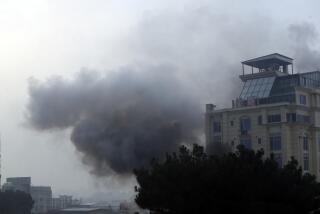Al Qaeda Suspect Sues U.S. Officials
- Share via
NEW YORK — A Syrian-born Canadian sued U.S. Atty. Gen. John Ashcroft on Thursday for deporting him to Syria as an Al Qaeda suspect and said government officials knew he would be tortured in a Damascus jail.
The lawsuit filed in Brooklyn federal court is the latest development in a case that has strained relations between the United States and Canada, raised security and human rights issues and led to a new deportation deal between Ottawa and Washington.
Computer technician Maher Arar was arrested between international flights at John F. Kennedy airport in New York in September 2002. He was interrogated for 13 days and expelled to Jordan and then Syria, where he said he was held for more than 10 months in a “dark, damp hole” and tortured.
Arar was freed in October 2003 and returned to Canada, but he is barred from entering the United States. At a news briefing in New York to announce the lawsuit, Arar talked via telephone.
“I believe that the persons who sent me to Syria knew that I would be interrogated under torture there,” said Arar, 33, who lives in Ottawa with his wife and two children. He has been unemployed since his return from Syria.
Arar added that he had “never knowingly associated with terrorists” and that under brutal treatment in Syria, he “falsely confessed to my torturers.”
One of his lawyers, Steven Watt, said: “Syria released him as an innocent man and an innocent man he remains today.”
In a statement Thursday, the U.S. Department of Justice said it believed Arar was a member of Al Qaeda, the terrorist group blamed for the Sept. 11, 2001, attacks.
The lawsuit named Ashcroft, Homeland Security Secretary Tom Ridge, FBI Director Robert S. Mueller III and a dozen other officials as defendants. It said Arar’s deportation broke U.S. and international laws against torture.
“In removing Mr. Arar, we acted fully within law and applicable international treaties,” the department said.
Lawyers for the Center for Constitutional Rights who filed the suit on Arar’s behalf said it was the first to challenge the government’s “extraordinary renditions” program of keeping foreigners suspected of being a security risk out of the country.
The center has challenged U.S. detention and deportation policy.
More to Read
Sign up for Essential California
The most important California stories and recommendations in your inbox every morning.
You may occasionally receive promotional content from the Los Angeles Times.









